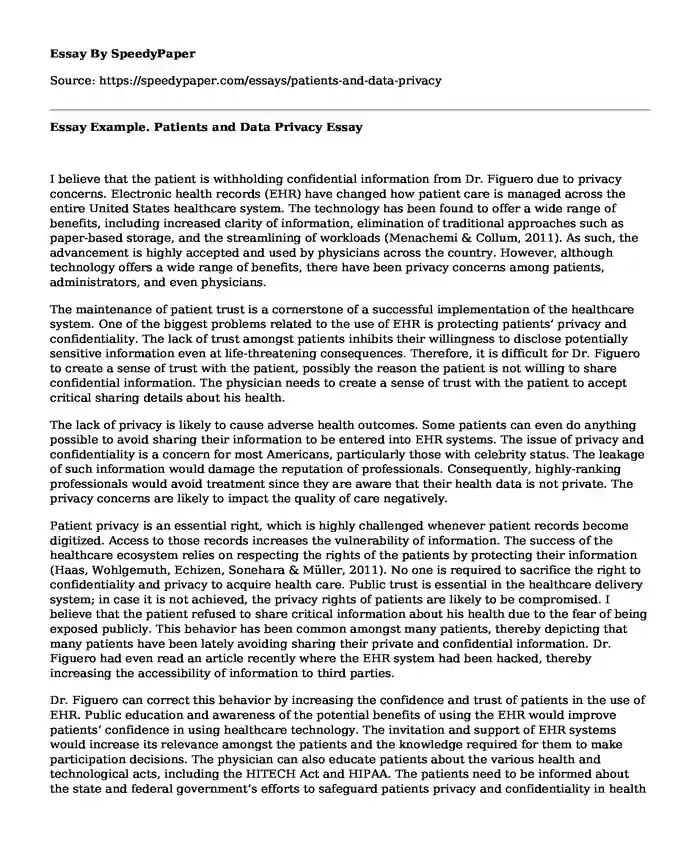
| Type of paper: | Essay |
| Categories: | Data analysis Medicine Security Customer service |
| Pages: | 3 |
| Wordcount: | 654 words |
I believe that the patient is withholding confidential information from Dr. Figuero due to privacy concerns. Electronic health records (EHR) have changed how patient care is managed across the entire United States healthcare system. The technology has been found to offer a wide range of benefits, including increased clarity of information, elimination of traditional approaches such as paper-based storage, and the streamlining of workloads (Menachemi & Collum, 2011). As such, the advancement is highly accepted and used by physicians across the country. However, although technology offers a wide range of benefits, there have been privacy concerns among patients, administrators, and even physicians.
The maintenance of patient trust is a cornerstone of a successful implementation of the healthcare system. One of the biggest problems related to the use of EHR is protecting patients’ privacy and confidentiality. The lack of trust amongst patients inhibits their willingness to disclose potentially sensitive information even at life-threatening consequences. Therefore, it is difficult for Dr. Figuero to create a sense of trust with the patient, possibly the reason the patient is not willing to share confidential information. The physician needs to create a sense of trust with the patient to accept critical sharing details about his health.
The lack of privacy is likely to cause adverse health outcomes. Some patients can even do anything possible to avoid sharing their information to be entered into EHR systems. The issue of privacy and confidentiality is a concern for most Americans, particularly those with celebrity status. The leakage of such information would damage the reputation of professionals. Consequently, highly-ranking professionals would avoid treatment since they are aware that their health data is not private. The privacy concerns are likely to impact the quality of care negatively.
Patient privacy is an essential right, which is highly challenged whenever patient records become digitized. Access to those records increases the vulnerability of information. The success of the healthcare ecosystem relies on respecting the rights of the patients by protecting their information (Haas, Wohlgemuth, Echizen, Sonehara & Müller, 2011). No one is required to sacrifice the right to confidentiality and privacy to acquire health care. Public trust is essential in the healthcare delivery system; in case it is not achieved, the privacy rights of patients are likely to be compromised. I believe that the patient refused to share critical information about his health due to the fear of being exposed publicly. This behavior has been common amongst many patients, thereby depicting that many patients have been lately avoiding sharing their private and confidential information. Dr. Figuero had even read an article recently where the EHR system had been hacked, thereby increasing the accessibility of information to third parties.
Dr. Figuero can correct this behavior by increasing the confidence and trust of patients in the use of EHR. Public education and awareness of the potential benefits of using the EHR would improve patients’ confidence in using healthcare technology. The invitation and support of EHR systems would increase its relevance amongst the patients and the knowledge required for them to make participation decisions. The physician can also educate patients about the various health and technological acts, including the HITECH Act and HIPAA. The patients need to be informed about the state and federal government’s efforts to safeguard patients privacy and confidentiality in health care. The physician should teach or inform the patient that her institution or the healthcare facility she is working in has met the recommended federal and state guidelines regarding the protection of patients’ private and confidential data. She can explain to the patient about her EHR system, which she thinks it’s safe due to the two-factor authentication and other additional features.
References
Haas, S., Wohlgemuth, S., Echizen, I., Sonehara, N., & Müller, G. (2011). Aspects of privacy for electronic health records. International journal of medical informatics, 80(2), e26-e31.
Menachemi, N., & Collum, T. H. (2011). Benefits and drawbacks of electronic health record systems. Risk management and healthcare policy, 4, 47.
Cite this page
Essay Example. Patients and Data Privacy. (2023, Aug 30). Retrieved from https://speedypaper.com/essays/patients-and-data-privacy
Request Removal
If you are the original author of this essay and no longer wish to have it published on the SpeedyPaper website, please click below to request its removal:
- Musculoskeletal Disorder - Free Essay with a Case Study
- Essay Example on the Brand for Wheelchair Users
- Essay Sample on Obesity Prevention
- Case Study Paper Example on Unipolar Depression
- Alzheimer's and Other Dementias' Impact in Communities of Color, Free Essay to Download
- Pursuing a Career in Dentistry: A Journey of Self-Discovery - Essay Sample
- Good Forecast Methods Should Have Normally Distributed Residuals. Free Essay
Popular categories




